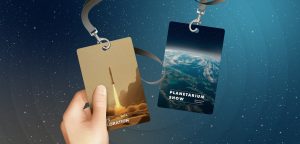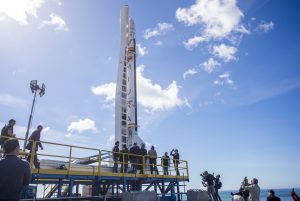April’s Hottest Space Events in the UK
29th Mar 2024
While we’re all in anticipation of Easter and a total solar eclipse, why not elevate your April adventures to cosmic heights with the most exciting space events happening across the UK? From planetarium tours to thought-provoking panel discussions on the future of space exploration, this month is brimming with opportunities to delve into the wonders of the universe!
Women in Science: Space Tour
When: 2 April
Where: Southend Central Museum & Planetarium, Victoria Avenue Southend-on-Sea SS2 6EW United Kingdom
Take a guided tour of our first-floor Hintze Hall balconies and Minerals Gallery and hear the gripping stories of female scientists whose contributions changed our understanding of space. Encounter numerous treasures, including rare meteorites, as you learn about the research of female space scientists past and present, including some who’ve worked at the Museum. Discover more about our displays and the cutting-edge science and space research we’re doing.
Meet the Meteorites
When: 3 April
Where: Southend Central Museum & Planetarium, Victoria Avenue Southend-on-Sea SS2 6EW United Kingdom
Do you know your meteors from your meteoroids? Where do comets come from? What actually is a shooting star? Join the knowledgeable planetarium team to discover all this and more at one of our special object-handling sessions.
Get hands-on and reach for the stars in one of these sessions with real space materials, interactive ses, and analysis like an astronaut to uncover their mysterious galactic past as part of this Easter holiday Space Day.
Panel Discussion: How can the space sector overcome international conflicts?
When: 8 April
Where: Royal School of Mines, Royal School of Mines London SW7 2AZ United Kingdom
Many countries and the private sector are demonstrating an increased interest in the space sector. As international tensions rise, there’s growing concern that the space sector will become an additional arena for international conflicts. Many potential avenues exist that may foster this extension of conflict, including space resource extraction, space debris mitigation, and military uses of space. Conversely, by addressing Earth’s numerous challenges through peaceful utilization of the space sector, we can contribute to a safe and sustainable long term future. The stakes are high, and many problems remain unsolved.
In partnership with the Space Generation Advisory Council, a panel has been assembled to address the question: How can the space sector overcome international conflicts? The panellists will address the question separately through presentations, followed a chaired discussion and audience Q&A.
Pulsating stars as finely tuned instruments in the stellar symphony
When: 11 April
Where: Room P/L/001, School of Physics, Engineering and TechnologyCampus West University of York York YO10 5DD United Kingdom
Stars are the building blocks of galaxies in the Universe and are responsible for making most of the chemical elements on the periodic table. Therefore, astronomers want to understand how stars are born, and what happens during and at the ends of their lives. Deep within a star like our own Sun, hydrogen is being converted into helium through nuclear fusion. How long a star lives for depends on how much hydrogen fuel is available. An excellent method to measure the amount of hydrogen fuel in a star is called asteroseismology, which is the study of ‘star quakes’ and is similar to how geologists probe the interior of the Earth using earthquakes. The energetic and noisy conditions inside a star cause waves that reach the surface causing it to twinkle and shimmer, which asteroseismologists use to measure a star’s interior properties. Pulsating stars are commonplace in the Universe each providing a different piece of the cosmic puzzle.
In this public lecture, Dominic provides an introduction to asteroseismology and discuss its application to stars using high-precision data from space telescopes. He pays particular attention to asteroseismology of massive stars, which are much bluer and have more than ten times the mass of the Sun. Massive stars are important factories in the Universe since they provide chemical and energetic feedback to their surroundings through their winds and explosive deaths as supernovae. However, our theoretical models for how massive stars evolve currently contain large uncertainties for key ingredients such as rotation and mixing processes. These unknowns propagate throughout stellar evolution making it difficult to accurately determine a star’s mass and age, thus complicating our predictions of supernovae yields. In his talk, he discusses novel constraints on the interior physics of massive stars learned from ongoing space telescope missions.
Subject: Astronomy. Teaching and learning about the oldest science
When: 16 April
Where: The Royal Astronomical Society, Piccadilly London W1J 0BQ United Kingdom
Curiosity about the cosmos is one of the things that makes us human. People of all ages and all cultures engage with the subject naturally, but much of this engagement lies beyond any formal educational curriculum. In the UK and throughout the world, the opportunities for developing interest in the subject are manifold and increasingly so, given current advances in educational technology. Formal UK qualifications in the subject have existed for some time, spanning the age range. How, in the 21st century, is the understanding of Astronomy being acquired and shared, and as educational practice evolves, how might this be changing?
International Conference on Energy from Space 2024
When: 17-19 April
Where: Royal Aeronautical Society HQ, London
Following the success of the ESA/UK Space Agency/Department for Energy Security and Net Zero online event in October 2023, this in-person event promises to delve deeper into the realm of clean energy from space for a greener future and provide an effective forum for networking and building new partnerships between the space and energy sectors in this exciting field.
Discourse: Decoding the Cosmos (Theatre)
When: 26 April
Where: The Royal Institution of Great Britain, 21 Albemarle Street London W1S 4BS United Kingdom
Just a century ago, observational evidence established the existence of other galaxies besides our own. Soon afterwards, it was discovered that the Universe is expanding, driving a profound change in our understanding of the cosmos. In 1998, the prevailing cosmological paradigm was again upended by the discovery that the Universe’s expansion is accelerating.
Since then, the remarkable progress in cosmology, spanning Peiris’s research career, has been driven by the close interplay between theory and observations. Observational discoveries have led to a Standard Model of cosmology with ingredients not present in the standard model of particle physics – dark matter, dark energy, and a primordial origin for cosmic structure. The physical nature of these ingredients remains a mystery. The race to unravel this cosmic puzzle is now underway, motivating a new generation of ambitious sky surveys across the electromagnetic spectrum and using new messengers such as gravitational waves.
Peiris will describe some highlights from her journey through this rapidly changing cosmological landscape in this discourse. She will also discuss how laboratory experiments are helping us test new fundamental physics paradigms developed to explain cosmological observations.
Is it Aliens?: The Most Unusual Star In The Galaxy
When: 29 April
Where: Conway Hall, 25 Red Lion Square London WC1R 4RL United Kingdom
Boyajian’s star, a faint and unprepossessing presence in the constellation of Cygnus, attracted astronomers’ attention when it began to flicker alarmingly. You will discuss explanations for its behaviour, from disintegrating comets to alien megastructures and consider how modern astronomy hunts for the truly unusual objects in the Universe.
Lisa Kaltenegger ‘Alien Earths: Planet Hunting in the Cosmos’
When: 30 April
Where: Blackwell’s Bookshop, 48-51 Broad Street Oxford OX1 3BQ United Kingdom
For thousands of years, humans have wondered whether we’re alone in the cosmos. Now, for the first time, we have the technology to investigate. The question should have an obvious answer: yes or no. But once you try to find life elsewhere, you realize it is not so simple. How do you find it over cosmic distances? What actually is life?
Astronomer Lisa Kaltenegger works from Carl Sagan’s former office at Cornell University, where she built a team of tenacious scientists from many disciplines to find life on faraway worlds, using Earth’s diverse biosphere and its history as a Rosetta Stone. With infectious enthusiasm, she provides an eye-opening insider’s guide to the most unusual exoplanets that have shaken our worldview – planets covered in oceans of lava, lonely wanderers lost in space, and others with more than one sun in their sky – as well as the best contenders for Alien Earths. She also shows how close imagined sci-fi worlds come to reality.
Careers in the Space Industry
When: 30 April
Where: HSDC Alton, Old Odiham Road Alton GU34 2LX United Kingdom
Careers in the space industry include a programme of talks by industry and careers professionals. The talks are followed by a visit to an exhibition to meet employers, training and education providers. The event is open to students from Year 9 (14-years-old) upwards, parents and career changers.
Have you picked the space events you’re planning to attend? If not yet, hurry up! Book your ticket or register today to immerse yourselves into the ultimate cosmic experience. Until next time, may your adventures in the cosmos be as infinite as the universe itself.






Thank you for your comment! It will be visible on the site after moderation.